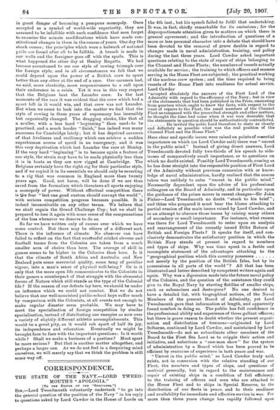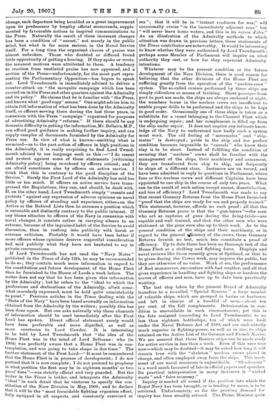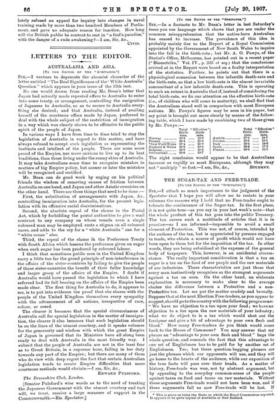CORRESPONDENCE.
THE STATE OF THE NAVY.—LORD TWEED- MOUTH'S "APOLOGIA."
[To THE EDITOR Or THZ "SPECTATOR."1
SIR,—Lord Tweedmouth voluntarily undertook "to go into the general question of the position of the Navy" in his reply to questions asked by Lord Cawdor in the House of Lords on the 4th inst., but his speech failed to fulfil that undertaking. It was, in fact, Chiefly remarkable' for its omissions ; for the disproportionate attention given to matters on which there is
general agreement; and the introduction of questions of a more or less personal character into a debate that should have been devoted to the renioval of grave doubts in regard to changes made in naval administration, training, and policy
during the last three years. Lord Cawdor asked important questions relating to the state of repair of ships belonging to the Channel and Home Fleets ; the numbers of vessela actually available for service; the training to which officers and seamen serving in the Home Fleet are subjected; the practical working of the nucleus-crew system ; and the time required to bring vessels of the Home Fleet into readiness for actual service.
Lord Cawdor
" accepted absolutely the answers of the First Lord of the Admiralty with regard to the efficiency of the Navy ; but in view of the statements that had been published in the Press, emanating from quarters which ought to know the facts, with respect to tho want of repairs to.the Fleet, the small numbers of the Channel Fleet as compared with the prescribed strength and other matters, he thought the time had come when it was very desirable- that the statements in question should be authoritatively contradicted.
He invited the noble Lord therefore to state as .clearly and definitely as possible what was the real position of the Channel Fleet and the Home Fleet."
Here clear and specific issues were raised on points of essential importance on which (as Lord Cawdor said) there was "unrest in the public mind." Instead of giving direct answers, Lora Tweedmouth devoted fully two-thirds of his speech to side- issues of comparatively small importance, or to questions On which no doubt existed. Possibly Lord Tweedmouth, coming as he has done straight into the responsible position of First Lord of the Admiralty without previous connexion with or know- ledge of naval administration, hardly realised that the course taken was unlikely to calm "unrest in the public mind." Necessarily dependent upon the advice of his professional colleagues on the Board Of Admiralty, and in particular upon the guidance of the prime mover in recent changes—Sir John Fisher—Lord 'Tweedmouth no doubt "stuck to his brief " ; and thbse who prepared it must bear the blame attaching to partial evasion of the main issues raised by Lord Cawdor, and to an attempt to obscure those issues by raising many others of secondary or small importance. For instance, what reason was there for Lord Tweedmouth to enter upon an analysis and rearrangement of the recently issued Dilke Return of British and Foreign Fleets ? It speaks for itself, and con- clusively demonstrates the satisfactory position in which the British Navy stands at present in regard to numbers and types of ships. Why was time spent in a feeble and incomplete statement of the advantages attaching to the
"geographical position which this country possesses not merely by the position of the British Isles, but by its possessions in all parts of the world " ? All that has been illustrated and better described by competent writers again and again. Why was a digression made into the future naval policy of the Colonies, and the question of the assistance they could give to the Royal Navy by starting flotillas of smaller ships, such as submarines and destroyers ? No one desired to have a detailed list, with biographical notices, of the Naval Members of the present Board of Admiralty, yet Lord Tweedmouth gave that information at length, and apparently found comfort in doing so. The public has full confidence in the professional ability and experience of these gallant officers; but there is grave reason to doubt whether the present organi- sation and distribution of 'business—originated by Lord Selborne, continued by Lord Cawdor, and maintained by Lord Tweedmouth—do not so subordinate other members of the Board to the First Sea Lord as to cripple their action and initiative, and substitute a "one-man show" for the system of administration by a Board 'which has been proved to be efficient by centuries of experience in both peace and war. "Unrest in the public mind," as Lord Cawdor truly ' said,
exists, not in connexion with the relative standing of our Fleet, the numbers and types of ships, and questions of materiel generally, but in regard to the maintenance and repair of existing ships in a condition of full efficiency, to the training of officers and men who are attached to the Home Fleet and to ships in Special Reserve, to the distribution of our fleets in peace, and to their readiness and availability for immediate and. effective service in war. For more than three years change has rapidly followed upon
change, each departure being heralded as a great improvement upon its predecessor by lengthy official memoranda, supple- mented by favourable notices in inspired communications to the Press. Naturally the result of these incessant changes has been a condition of "unrest," not merely in the public mind, but what is far more serious, in the Naval Service itself. For a long time the organised chorus of praise was almost unbroken. Those who doubted or differed found little opportunity of getting a hearing. If they spoke or wrote, the meanest motives were attributed to them. A tendency to reaction from unstinted praise has now appeared, and a section of the Press—unfortunately, for the most part repre- senting the Parliamentary Opposition—has begun to speak out. Lord Tweedmouth is immediately advised to deliver a counter-attack on "the mosquito campaign which has been carried on in the Press and other quarters against the Admiralty and its policy." He claims that he is familiar with " the Press, and knows what 'good copy' means." One might advise him to obtain full information of what has been done by the Admiralty itself, or officers serving there during the last three years, in connexion with the Press "campaign" organised for purposes of advertising Admiralty "reforms." If there should be any domestic difficulty in getting the information, Mr. Bellaire, M.P., can afford good guidance in making further inquiry, and can supply samples of documents furnished by the Admiralty for Press use. In view of what is known—omitting what is surmised—as to the past action of officers in high positions in the Admiralty, it is really surprising to find Lord Tweed- mouth advised to use language such as this :—" I do resent and protest against some of these statements [criticising Admiralty policy] being re-echoed by officers retired ; and I am afraid sometimes also by officers on active service. I think that this is contrary to the good discipline of the Service." Surely the First Lord of the Admiralty has said too little or too much. If officers on active service have trans- gressed the Regulations, they can, and should, be dealt with. If, on the other hand, Lord Tweedmouth simply "resents and protests" against any expression of adverse opinions on naval policy by officers of standing and experience, eitherton the Active or the Retired Lists then he assumes a position which is untenable and distinctly contrary to the public interest. If any blame attaches to officers of the Navy in connexion with naval changes, it consists rather in carrying silence to an extreme, because of the ingrained habit of the Service to avoid discussion, than in rushing into publicity with harsh or extreme criticism. Probably it would have been better if more officers whose opinions deserve respectful consideration had said publicly what they have not hesitated to say in private conversations.
If Lord Tweedmouth has not read the "Navy Notes" published in the Times of July 12th, be may be recommended to do so; they contain much more information in regard to the constitution and future development of the Home Fleet than he furnished to the House of Lords a week before. The writer does not say that he has been given this information by the Admiralty; but he refers to the "ideal to which the professions and declarations of the Admiralty, albeit some- what oracularly expressed, must be held quite unmistakably to point." Previous articles in the Times dealing with the "State of the Navy" have been based avowedly on information obtained from the Admiralty by the writers ; possibly this has been done again. But one asks naturally why these channels of information should be used immediately after the First Lord has spoken. Direct official statement surely would have been preferable and more dignified, as well as more courteous to Lord Cawdor. It is interesting to be told by Lord Tweedmouth that "the idea of the Home Fleet was in the mind of Lord Selborne: who (in 1904) was perfectly aware that a Home Fleet was in con- templation, and was going to take shape in due time." The further statement of the First Lord—" It must be remembered that the Home Fleet is in process of development; I do not pretend that it is now complete ; I do not pretend to prophesy in what position the fleet may be in eighteen months' or two years' time "—was strictly official and very guarded. But the writer in the Times is bolder, and interprets the Admiralty "ideal" in such detail that he ventures to specify the con- stitution of the Nore Division in May, 1908; and to declare that it will be the "most formidable fighting organism afloat, fully equipped in all respects, and constantly exercised at sea"; that it will be in "instant readiness for war," will occasionally cruise "in the immediately adjacent seas," bat "will never leave home waters, and this is its raison d'être." As an illustration of the Admiralty methods to which attention was drawn in previous letters, these statements of the Times contributor are noteworthy. It would be interesting to know whether they were authorised by Lord Tweedmouth ; perhaps some Member of Parliament will inquire on what authority they rest, or how far they represent Admiralty intentions.
Whatever may be the present condition or the future development of the Nose Division, there is good reason for believing that the other divisions of the Home Fleet are suffering greatly from the operation of the "nucleus-crew" system. The so-called cruises performed by these ships are simply ridiculous as means of training. Short passages from port to port are made, the ships are always anchored at night, the numbers borne in the nucleus crews are insufficient to enable proper drills to be performed and the ships to be kept in good order. Occasionally one of these ships is taken as a substitute for a vessel belonging to the Channel Fleet which is undergoing repair; and her complement is filled up from the sgfp under repair. It does not require any intimate know- ledge of the Navy to understand bow badly such a system must work. The old feeling of " messmates " and " ship- mates " is destroyed ; pride in the ship and her perfect condition becomes impossible to "casuals" who know their stay is to be short. Instead of fulfilling the condition of securing that "nucleus" crews shall be familiar with the management of the ships, their machinery and armament, they are transferred from ship to ship, and frequently to ships of a different class. Instances are on record, and have been admitted in reply to questions in Parliament, where four or five nucleus crews and different Captains have been appointed to one ship in the course of only two years. What can be the result of such action except unrest, dissatisfaction, and loss of efficiency ? Lord Tweedmouth was made to say that recent Gunnery Returns from the Home Fleet furnished "proof that the ships are ready for sea and properly trained." This statement, however, affords no such proof : all that the Gunnery Returns prove is that the "gun-layers "—the men who act as captains of guns during the firing-trials—are capable and well trained, and that the other men who were stationed at the guns were also up to their work. As to the general condition of the ships and their machinery, or in regard to the general eifficiency of the crews, these Gunnery Returns furnish no test, much less constitute a proof of efficiency. Up to date there has been no thorough test of the Home Fleet as a striking and fighting force. Displays and naval 'reviews like those recently given at Spithead, or that to be given during the Cowes week, may impress the public, but they are otherwise of no value. Work at sea, the performance of fleet manceuvres, encounters with bad weather, and all that gives experience in handling and fighting ships or hardens the nerves of officers and men, have up to date been practically wanting.
The last step taken by the present Board of Admiralty transfers to a so-called "Special Reserve" a large number of valuable ships, which are grouped in basins or harbours, and left in charge of a handful of men,—about ten per cent. of the full complements. Deterioration in con- dition is unavoidable in such circumstances ; yet this is the fate assigned (according to Lord Tweedmouth) to no less than eighteen battleships, ten of which were built under the Naval Defence Act of 1889, and are undoubtedly much superior in fighting-power, as well as in size, to ships retained on the Active List of the German and French Navies. We are assured that these Reserve ships can be made ready for active service in less than a week. Even if this were true now—which may be doubted—it may be asked how long it will remain true with the " skeleton " nucleus crews placed in charge, and often employed away from the ships. Thig treat- ment of our naval resources is unjustifiable. " Obsolescent " is a word much favoured of late in official papers and speeches. Its practical interpretation in many instances is "wicked waste" and "false economy."
Inquiry is needed all round if the position into which the Royal Navy has been brought, or is tending to move, is to be retrieved. Unfortunately, so far the growing demand for inquiry has been steadily refused. The Prime Minister quite
lately refused an appeal for inquiry into changes in naval training made by more than two hundred Members of Parlia- meat, and gave no adequate reason for inaction. How long will the British pnblic be content to rest in "a fool's paradise," with the danger of a rude awakening P-1 am, Sir, &c.,
(Avis.








































 Previous page
Previous page